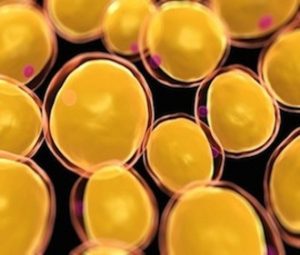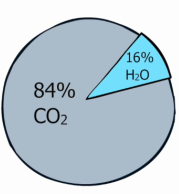If you’re carrying a few extra pounds, you probably know that losing weight will lower your risk of cancer and other chronic diseases. When you lose weight, y our fat doesn’t just disappear. But do you know where it goes?
our fat doesn’t just disappear. But do you know where it goes?
If you’re stumped, don’t feel bad—the authors of a recently published paper asked 150 family doctors, dietitians, and personal trainers the same question and found that most of them got the answer wrong.
The most common answer given was that fat is converted to energy, but the authors point out that this violates the law of conservation of mass, one of the fundamental laws of chemistry. Other misconceptions were that fat is converted to muscle or broken down and excreted in the feces.
Before going further, it may be helpful to review how we convert excess food to fat in the first place. When we eat more protein or carbohydrates than we need, we convert them to fat molecules called triglycerides and store them in fat cells. The fat in food is already in the form of triglycerides, so if we eat too much, no conversion is necessary before it is stored.
So what happens when we lose weight? During weight loss, we break down the triglycerides stored in our fat cells in a process called oxidation, aptly named since it requires oxygen. When we oxidize triglycerides, we convert them to carbon dioxide and water, generating energy in the process. We use the energy for our daily activities, exhale the carbon dioxide, and get rid of the excess water in our bodily fluids such as urine, feces, sweat, breath, and tears.
 The authors of this study were curious about how much carbon dioxide vs. water we produce when we break down the triglycerides in our fat cells during weight loss. They came up with a new calculation showing that when fat is broken down, 84% of the atoms are converted to carbon dioxide and 16% are converted to water. This means that we exhale most of the atoms that were originally stored in our fat cells through our lungs.
The authors of this study were curious about how much carbon dioxide vs. water we produce when we break down the triglycerides in our fat cells during weight loss. They came up with a new calculation showing that when fat is broken down, 84% of the atoms are converted to carbon dioxide and 16% are converted to water. This means that we exhale most of the atoms that were originally stored in our fat cells through our lungs.
But that doesn’t make breathing faster a weight loss strategy—the body won’t oxidize triglycerides stored in our fat cells unless it needs energy, and this only happens when we eat less food than we need. So the weight loss prescription is the same as it’s always been: eat less and move more.






Thanks for such an informative post, we are also involved in this field and welcome your visit at our website.